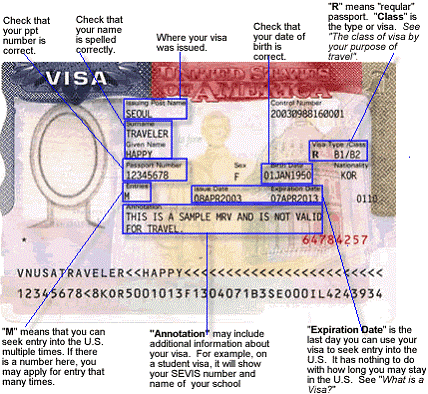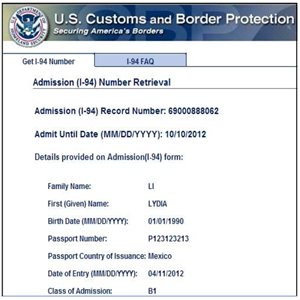A lot of times clients will come to us and say,
"Help! My visa is going to expire soon!"
But is it? Let's talk about the difference between the visa and I-94.
It is important to take a minute and get some clarity around what document is expiring. The visa and I-94 are similar documents, but they are not the same document, and it is critical to be aware of which document is expiring and when.
 The visa is a document that is placed in your passport when you apply for a visa at the U.S. Consulate overseas. It is the document that you will show to the officer at the port-of-entry when you apply for admission to the United States. The visa will include your photograph, name, date of birth, and the visa validity, and it will indicate if the visa is a single use or multiple use visa. Note that Canadians are visa exempt, and it is possible in some instances to enter on ESTA.
The visa is a document that is placed in your passport when you apply for a visa at the U.S. Consulate overseas. It is the document that you will show to the officer at the port-of-entry when you apply for admission to the United States. The visa will include your photograph, name, date of birth, and the visa validity, and it will indicate if the visa is a single use or multiple use visa. Note that Canadians are visa exempt, and it is possible in some instances to enter on ESTA.
The I-94, on the other hand, is a document that U.S. Customs and Border Protection issues you when you enter the United States. So, when you arrive at the port of entry, you will show them your visa, and the officer will enter information such as your name, your date of birth, your visa classification, and the dates that you're admitted to the United States into their system.

As soon as you enter the United States, it is important that you check your I-94 to make sure that the information is correct and to confirm the validity period that you are given. The validity period is determined in part by the discretion of the officer. Sometimes they can get the validity information incorrect, or it can be shortened depending on your passport validity. If you enter on an F-1 visa or a J-1 visa the validity of your I-94 will say “D/S” which means duration of status. Make a note of when your I-94 is going to expire and speak with your immigration lawyer to have a plan in place to ensure you do not stay longer than that validity period given.
In addition, your I-94 validity is not necessarily going to match your visa validity and, in fact, many times it won't. For example, if you are entering on a B-1/B-2 visa, your I-94 may reflect that your admission to the United States is valid for 180 days, but your visa may be valid for five or ten years. In this situation, it doesn’t mean you can stay in the United States for five years or ten years; you must refer to your I-94 to see how long you are actually permitted to remain in the U.S..
In summary, while both the visa and the I-94 are critical immigration documents, they serve different purposes and you must keep track of the validity and expiration of both document types.
As always, the above information is for educational purposes only and is not legal advice. Please speak with a qualified immigration lawyer before taking action. If you need help navigating the immigration process with confidence, please contact us today to get the process underway! We are immigration lawyers in Richmond, VA but we serve clients throughout the U.S. and around the world. You can call us at 804-396-3412 or send us an email at info@sumnerimmigration.com. We look forward to hearing from you!




 The visa is a document that is placed in your passport when you apply for a visa at the U.S. Consulate overseas. It is the document that you will show to the officer at the port-of-entry when you apply for admission to the United States. The visa will include your photograph, name, date of birth, and the visa validity, and it will indicate if the visa is a single use or multiple use visa. Note that Canadians are visa exempt, and it is possible in some instances to enter on ESTA.
The visa is a document that is placed in your passport when you apply for a visa at the U.S. Consulate overseas. It is the document that you will show to the officer at the port-of-entry when you apply for admission to the United States. The visa will include your photograph, name, date of birth, and the visa validity, and it will indicate if the visa is a single use or multiple use visa. Note that Canadians are visa exempt, and it is possible in some instances to enter on ESTA.



